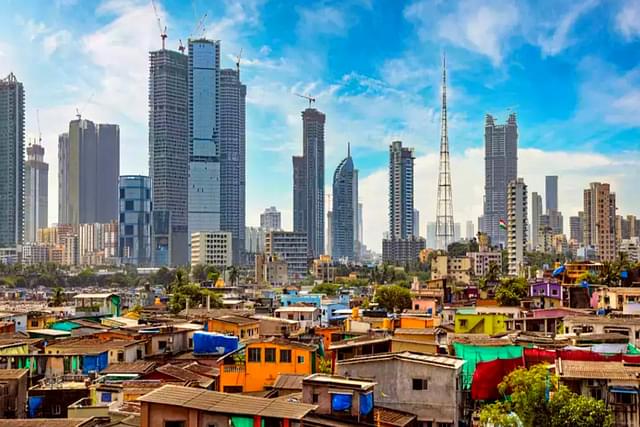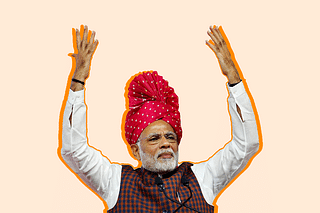Infrastructure
Mumbai Slum Sanitation: Worker Societies Versus BMC In Legal Battle Over New Tender — Explained
V Bhagya Subhashini
Apr 24, 2024, 04:30 PM | Updated 04:30 PM IST
Save & read from anywhere!
Bookmark stories for easy access on any device or the Swarajya app.

The Mumbai Shahar Berojgar Seva Sahakari Sanstha, a federation of 584 sanitation, waste segregation and allied workers’ societies, has taken legal action against the Brihanmumbai Municipal Corporation (BMC) over a new tender that aims to consolidate sanitation services in Mumbai's slums under a single service provider.
It potentially affects the livelihoods of thousands of workers.
The Existing System: Swachh Mumbai Prabodhan Abhiyan (SMPA) Scheme
Under the SMPA scheme, the BMC has engaged nearly 2,300 societies to provide sanitation services across Mumbai's slums. Workers employed under this scheme are commonly referred to as 'volunteers'.
Despite their crucial role in maintaining cleanliness, these workers receive a meagre monthly honorarium of Rs 5,600.
The New Tender
On 16 February, the BMC floated a new tender inviting bids from companies to take over sanitation work in slums. It extended the deadline to 25 April.
The benefits of the new tender are numerous. Unlike the current volunteers who work for 8 hours without supervision or accountability, workers under the new system will undergo a rigorous selection process.
They will be supervised by the contractor, address complaints promptly, face penalties for unfinished tasks, and receive proper safety training, tools, and technology.
This new initiative also promises a minimum wage of Rs 20,000 per month for workers, with an estimated total cost of Rs 1,400 crore over four years. The goal is to streamline and improve sanitation services in the city's slums.
The BMC also plans to introduce modern technology like mechanised waste collection systems, e-auto rickshaws, and power rodding machines to enhance efficiency, as per Deccan Herald's report.
Federation's Concerns
The Mumbai Shahar Berojgar Seva Sahakari Sanstha has raised several pressing concerns:
Exclusion from Bidding: The federation argues that the tender's stringent conditions, including an earnest money deposit (EMD) of Rs 14 crore, pose significant barriers to their participation.
Violation of Directives: The federation contends that the new tender contravenes a 2002 state directive, which mandates allocating sanitation work to societies of unemployed people.
Job Security: Workers fear mass unemployment as the new company takes over. Despite the court's suggestion to absorb 30-40 per cent of the existing workforce, uncertainty looms large.
BMC's Defence
The BMC has defended its tender, highlighting the following:
Accountability and Monitoring: Unlike the SMPA scheme, the new tender aims to introduce proper supervision, monitoring, and accountability for workers.
Technological Upgrades: The BMC plans to adopt technology-driven solutions like mechanised waste collection systems and e-auto rickshaws for efficient waste management.
State Directives: The BMC contends that the new tender aligns with a 2015 state government resolution, which only applies to work under Rs 3 lakh.
The controversy surrounding the new tender has garnered widespread attention. While some believe that the centralisation could streamline and improve sanitation services, others argue that it could jeopardise the livelihoods of thousands of workers and undermine local expertise.
The future remains uncertain for Mumbai's sanitation workers. The case underscores the urgent need for transparent, inclusive, and equitable policies in municipal sanitation projects to safeguard the interests of workers and ensure the efficient delivery of services.
Save & read from anywhere!
Bookmark stories for easy access on any device or the Swarajya app.
Support Swarajya's 50 Ground Reports Project & Sponsor A Story
Every general election Swarajya does a 50 ground reports project.
Aimed only at serious readers and those who appreciate the nuances of political undercurrents, the project provides a sense of India's electoral landscape. As you know, these reports are produced after considerable investment of travel, time and effort on the ground.
This time too we've kicked off the project in style and have covered over 30 constituencies already. If you're someone who appreciates such work and have enjoyed our coverage please consider sponsoring a ground report for just Rs 2999 to Rs 19,999 - it goes a long way in helping us produce more quality reportage.
You can also back this project by becoming a subscriber for as little as Rs 999 - so do click on this links and choose a plan that suits you and back us.
Click below to contribute.





